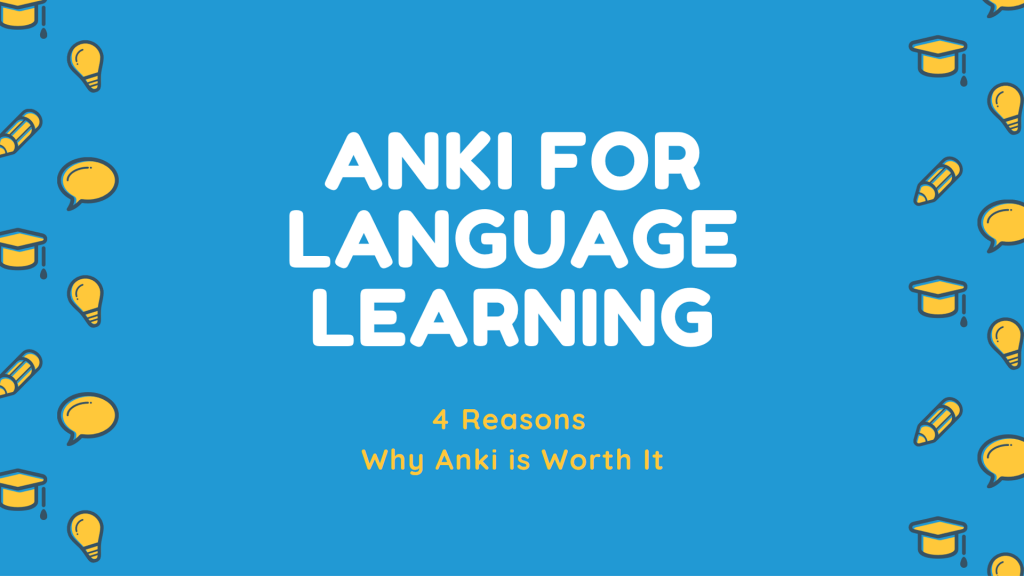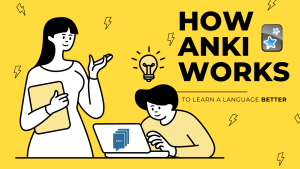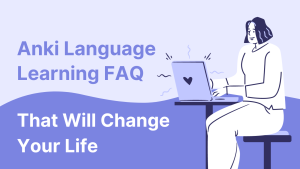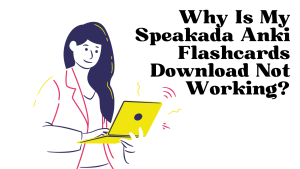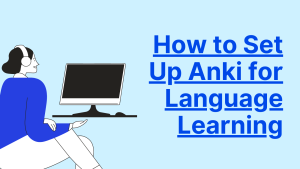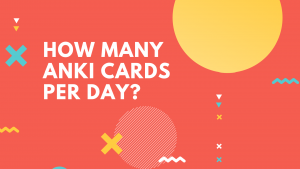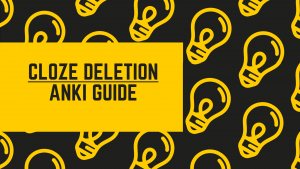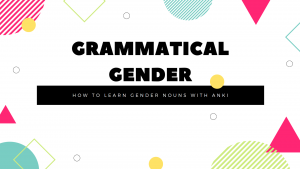Anki for Language Learning: 4 Reasons Why Anki is a Powerful Tool to Learn Languages Now
You may be wondering: Is Anki worth it for language learning? After several years of using Anki for language learning, I can confidently say that Anki is worth it and a good tool for learning languages.
For several years and to this day, I have been adding and reviewing cards to learning multiple languages including Spanish and Chinese Mandarin. I have even used Anki to teach my children languages from 6 months old.
Anki has certainly made a positive impact in my languages, and that is why I continue to use it.
What is Anki?
Anki is a flashcards software program and mobile application. You can use Anki as a flashcards software program on your personal computer, Mac computer or laptop. In addition, you can use Anki as a flashcards mobile app on your smartphone or tablet for Apple iOS devices and Android devices.
Anki stands out from other flashcards apps and programs because you can make and study your own flashcards and totally customize them according to your needs, it has a robust spaced repetition algorithm, and it has a strong community of users across language learning and other fields like medicine, other academic subjects and more.
You may be wondering: Is it really possible to learn a language with Anki flashcards?
Can You Learn a Language with Anki?
The short answer is yes.
In this article, I’ll discuss the reasons why Anki can be worth it for language learning, and argue why it can be beneficial for language learners. I’ll also examine the possible ways to learn a language from scratch to fluency with Anki as a tool to get you there.
Nevertheless, I’ll also discuss the potential limits and pitfalls of Anki, and acknowledge that Anki is not for everyone, especially when you take into account your personality, learning style and stage of language fluency.
Are you just starting out with language learning, and you’re not so sure about your own language learning style?
Then it may be worth it to familiarize yourself with Anki to see if it is worth it for you. Anki is free, and there is a large community of Anki users that can support you, so you can use a few days or weeks tinkering with Anki to see if it clicks for you and suits the way you like to learn.
You can download Anki for free here: https://apps.ankiweb.net/
Is Anki Good for Language Learning?
Yes, Anki can be great for learning languages. Here are 4 ways that Anki language learning can be worth it.
1. Anki Can Help You Learn the Foundations of a Language
One of the most difficult stages to learn a language is at the very beginning. It can be hard because there are just so many language features to learn and memorize. These language features include vocabulary, grammar, and pronunciation.
Just think of the amount of words you would typically have to learn and the grammar points to reach fluency. The level of fluency is often considered to be around the B2 level of the Common European Framework Reference for Languages (or CEFR). This alone is difficult to accomplish when you are constantly forgetting what you just learned. This is explained through Ebbinghaus’ Forgetting Curve, which shows the depreciation of our memory over time.
Language learners will often face the challenge of having to remember so much information about the language. So, language learners find that memorizing all of the language features can be the most challenging part of it all.
This is why Anki can be so good for language learning, especially at the beginning to intermediate phases. Anki is key in the beginning stages because it allows you to learn and retain pronunciation, vocabulary and grammar points easily and sustainably.
Anki is such a powerful tool for language learning because of its Spaced Repetition System, or SRS algorithm. Anki is like a booster to your memory so you can learn words, phrases, grammar points and more. When you use Anki, you can make sure you’ve got the foundation and basics of a language stored in your long-term memory. You can use the power of a computer program and app to manage your learning for you.
Some Anki critics argue that it is better to learn a language naturally through lots of listening and reading alone. They even argue that beginners and intermediate learners should go straight to listening and reading content in the target language. These Anki critics point to the research behind “comprehensible input”, which shows that language acquisition best occurs when you expose yourself to native language materials that are slightly above your current level, and which are enjoyable for you.
We at Speakada agree that comprehensible input, listening and reading are important elements of language acquisition. But if you want to get started with these and make the most of them, then you need to already know enough of the target language. Not knowing anything in a foreign language can make it extremely difficult to understand just about anything.
In fact, there is recent research that points to the effectiveness of doing some deliberate study through flashcards, as a means to language acquisition. On a practical level, too, Anki flashcards can also act as a bridge during the beginner and intermediate stages. When you study Anki flashcards, this can give you a basic foundation of the language before you move onto natural learning through listening and reading in the language.
This is one of the major reasons why Anki is so useful at the beginner and intermediate stages. Anki will help you to comprehend the most frequent words, core grammar and basic pronunciation. When you do this, then you can reach a breakthrough threshold where you know enough of the language, that you can focus more on enjoying comprehensible input through listening and reading.
2. Anki Helps Test Your Language Knowledge Regularly
Anki is very beneficial because of its unique ability to test your language knowledge.
Why is this important?
When you use Anki to test your language knowledge, you’re better able to pinpoint problems or weaknesses in your pronunciation, vocabulary and grammar. Therefore, it allows you to focus more time on problematic areas and less time on areas where you have greater confidence.
The brilliant thing about Anki is that it does all of this automatically for you through the daily review system. All you need to do is review your pending cards daily and Anki will figure out the most optimal time to review those cards again. For cards that are harder for you to memorize, you will see them more often in future. Whereas the cards you get correct will result in a gradually longer time until you see it again in future.
As you get better at memorizing certain language features, the spaces between each review get longer and longer. This spaced review keeps happening until you’ve mastered those certain language features, and they are in your long-term memory. This means that you don’t need to review them ever again, because it’s already there in your memory, and you’re actually more likely to see and review that word in the real world through listening, reading and interacting with the language.
This makes Anki a wonderful tool to help you learn a language as it allows you to assess your progress over time. With Anki, you’ll also be able to know what to work on moving forward.
3. Anki is Great for Language Exams
Students often use Anki as a tool to study for an upcoming exam. Language students use Anki to study for exams, and there are a number of case studies of language learners who have used Anki to great effect.
Some have even reached B2 fluency level and above, using Anki as one of their main tools of study. Just do a search online, and you can find several examples.
Some language exams can be very important for your life or career goals. In fact, some language learners have the aim of passing a language exam for work advancement, for a visa or citizenship test to live overseas, or to be able to enter a certain university or course where the target language is necessary. In these situations, you may feel very stressed trying to learn a language and manage your studies. Anki can be a great learning management tool to pass a specific test for your life and career goals.
Other students have also used Anki for exam preparation in other fields, such as medical school. In fact, an academic study conducted by researchers at Washington University a few years ago found that the more Anki flashcards students did, the higher their exam scores were.
The study concluded that: When students engage extensively in self-initiated retrieval practice, often with spaced repetition (with tools like Anki), these practices are associated with superior performance in examinations.
Students all around the world have begun using Anki to supplement other studying methods. The beauty of using Anki is that in addition to being able to create your own flashcards, there are also pre-made decks that are available, too. You can check out our own Speakada premade Anki flashcards, which will help you get started in your target language immediately.
4. Anki is Useful to Learn Technical or Rare Words
You can also use Anki to help you memorize technical jargon and rare words that you won’t see on a regular basis. This is especially helpful if you’ve already learned the foundations of a language, and are at the advanced or fluent stages.
As you read, watch, speak and immerse yourself in the language, you may come across more technical words or difficult words that you want to remember. You may feel that they are important words you want to retain, but the content you read and listen to will not expose you to this word enough times for you to remember it well.
In these cases, you can use Anki to help you collect these words and then use spaced repetition to ensure that you remember them. Anki can be very effective for this purpose.
The Bottom Line: Using Anki for Language Learning is Worth It
If you want a language learning tool that can help manage your studies, boost your memory and keep you accountable, then Anki is a valuable and effective app for this purpose.
The initial investment to try it out is minimal. It’s free for computers, Macs, Android smartphones. So, if you’re hesitant and worried, you could just download the free version of it first and make and study a few cards yourself. This can be a great way to get started and see if Anki for language learning is worth it for you personally.
